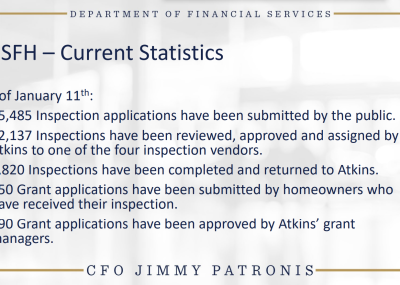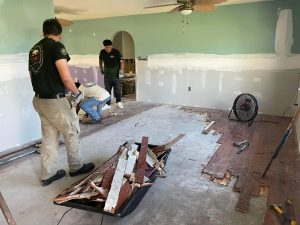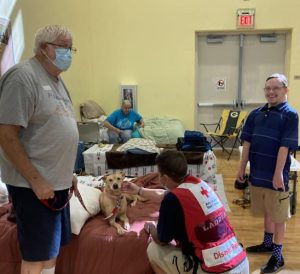Ian death toll rises
The Florida Legislature’s second week of committee meetings this past week came as news was breaking of two more deaths from September’s Hurricane Ian. The remains of an elderly man were found on his sunken sailboat and an elderly woman’s remains were found as crews were clearing debris in the mangroves – both in Lee County, where Ian made its destructive landfall. They were the last two missing people from the storm, whose death toll is now 148. This past week also saw Florida’s estimated insured losses from Ian climb to $12.9 billion, with 75% of the 683,000 claims closed. Hurricane Nicole’s insured losses stand at $396 million, with 77% of the 45,000 claims filed as of January 9 now closed. Meanwhile, flood claim payments by the National Flood Insurance Program took a big jump in the past two weeks, up 28% to a total payout to date of $2.2 billion on 45,800 claims.
 The State Administration and Technology Appropriations Subcommittee last Tuesday discussed the My Safe Florida Home (MSFH) program in depth and its relationship with hurricane damage prevention and recovery. Steven Fielder from the CFO’s office discussed the program’s mission to reduce insurance premiums for homeowners, particularly those that qualify as low income, by providing grants for home improvements to mitigate against future wind damage. He explained how homeowners qualify for the program, obtain an inspection, and other statutory requirements. These aspects of the program are tied to Florida building codes and wind-borne maps. Fielder shared the chart above, showing 390 grant applications have been approved since November 18.
The State Administration and Technology Appropriations Subcommittee last Tuesday discussed the My Safe Florida Home (MSFH) program in depth and its relationship with hurricane damage prevention and recovery. Steven Fielder from the CFO’s office discussed the program’s mission to reduce insurance premiums for homeowners, particularly those that qualify as low income, by providing grants for home improvements to mitigate against future wind damage. He explained how homeowners qualify for the program, obtain an inspection, and other statutory requirements. These aspects of the program are tied to Florida building codes and wind-borne maps. Fielder shared the chart above, showing 390 grant applications have been approved since November 18.

An AmeriCorps Disaster Response Team removes damaged flooring from a flooded home on Pine Island, Florida after Hurricane Ian, November 29, 2022. Courtesy, AmeriCorps
On Wednesday, the Senate Select Committee on Resiliency welcomed local government leaders and individuals from Lee, Collier, Charlotte, and Volusia Counties to share the impacts of Ian and Nicole’s catastrophic damage to their respective communities. Lee County Commissioner Kevin Ruane said that streamlining permitting and licensure during the recovery process would help with current delays. Senator Gayle Harrell (R-Stuart) suggested temporary licensing reciprocity for out-of-state contractors to assist with recovery. Beach renourishment, revenue recovery, environmental conservation and protection, and property ownership were all topics at the forefront in this meeting which will result in formal recommendations for future hurricane planning and recovery to the full legislature later in the session.
The next day its counterpart, the House Select Committee on Hurricane Resiliency & Recovery heard similar presentations as it welcomed some of the same guests along with Kevin Guthrie, the Director of Florida’s Division of Emergency Management (FDEM). Vice Chair Adam Botana (R-Bonita Springs), noting that at the 100-day mark for Hurricane Michael the state had received $0 from FEMA and that at 114 days after Hurricane Ian the state had received $512 million from FEMA, asked Guthrie what had changed. Guthrie credited Governor DeSantis with reactivating the Expedited Needs Program, which also created an expedited process to get the funds to recipients digitally.

Hurricane Ian victims take refuge at the Red Cross temporary shelter at Charlotte County’s Ann & Chuck Dever Regional Park. Courtesy, Red Cross
This committee spent more time discussing the options for individual assistance for homeowners and residents impacted by the storms, with Guthrie noting that the Hurricane Loss Mitigation Program is an option for homeowners, but it is limited. They also discussed debris removal and storm shelters. Guthrie said there is a “deficit of shelter space in Southwest Florida,” part of a broader issue given the state’s rapid population growth. Assistant County Administrator for Charlotte County, Emily Lewis, told the committee that all five county shelters collapsed during Ian, forcing those inside to be evacuated elsewhere. Three of those five building were public schools, built prior to the new code requiring schools be built to withstand hurricane force winds. In rebuilding those schools, “we’ll definitely need resources to harden most facilities because those are the only facilities that we have to use for shelters if we have to order evacuations,” Lewis said.
Also meeting last week was the Senate Banking and Insurance Committee, which held its first meeting of the new legislature. Members heard presentations from the Department of Financial Services and its Office of Financial Regulation (OFR) on their basic inner workings and responsibilities. OFR said it’s currently working on growing Florida’s economy by investing locally, through The Invest Local Act (SB 180), to better facilitate connections between entrepreneurs and angel investors.
LMA Newsletter of 1-23-23

